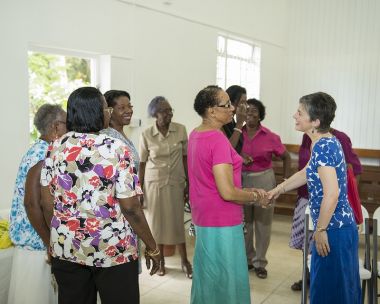Telling the story of oppressed women
Organisations, charities, churches and individuals are honouring the efforts of women around the world who are working to inspire change and eradicate gender injustice.
As part of the outworking of a passion to see this transformation become a reality, Gospel for Asia (GFA) is releaing a new documentary that uncovers the stories of millions of women who are oppressed, abused and discriminated against because of their gender.
'Veil of Tears', directed and produced by the award-winning Saylors brothers, will be released on 28 March. The hard-hitting documentary highlights the plight of an untold number of women and girls who suffer daily in South Asia, where gender inequality is rife.
It is common for women across this region to face abuses such as dowry-related homicide, bride burning, slavery, trafficking and forced prostitution.
Almost a quarter (24 per cent) of the total number of illegal abortions across the world are performed in India alone. Many women choose to abort their unborn child for fear of it being female, as girls are regarded as of far lower status and are therefore considered to be less valuable than boys.
Furthermore, modern sex-determination techniques are causing these statistics to rise. Officials estimate that 6.4 per cent of all pregnancies with a female foetus are aborted in India, which signifies a loss of over 100,000 female infants every year.
This is just one of the ways in which the systematic cultural oppression of women is normalised.
"This mistreatment is so integrated into societies that millions of women across South Asia wake up with little hope for tomorrow, their lives radically altered by abuse," explains founder and international director of GFA, Dr KP Yohannan.
"But we are helping to bring change: one girl, one woman at a time."
GFA works tirelessly to bring the Gospel to women who are suffering as a result of ingrained injustices that perpetuate the feminisation of poverty and restrict access to education, healthcare and political structures. Thousands of female missionaries are stationed all around the Asian region, offering love, hope and practical support to those that desperately need it.
"Our goal with 'Veil of Tears' is to realistically portray their plight, but also communicate that we have a moral obligation to care for these women, act on their behalf and bring some measure of hope and restoration to their lives," adds Dr Yohannan.
With the focus on women around International Women's Day today, the Anglican Communion has been encouraging its members worldwide to support women.
The Archbishop of Canterbury's wife, Caroline Welby, is marking International Women's Day on Saturday with her contribution to a free resource that details the work of inspiring women across the Anglican Communion.

Thousands of women across the globe are empowering others to fulfil their potential. The document shares stories that underline how "in faith and perseverance, women have become key leaders in transforming their communities – working for justice and development and responding to human need with loving service".
Mrs Welby shares of her recent visit to a war-torn country, where she met the wife of an Archbishop who is passionate about connecting orphaned children with foster families.
"I was very inspired to see this work coming out of a place of prayer," Caroline says of the meeting.
"I met so many other women on our trip who talked about having 'a number of children 'plus'...The 'plus' were the orphans from family and friends who have been welcomed into their families with open arms."
Another testimony comes from Rhoda Kwashi, a Nigerian woman who holds monthly seminars and retreats for women in the Diocese of Zonkwa, of which her husband is the bishop.
Women from all over the region are taught practical life skills to help raise them out of poverty, and are given the chance to discuss the issues which affect them in their daily lives.
"We still have a long way to go, but we will be steady and surely we will get there. We live by Philippians 4:13 which says: 'I can do all things through Christ who gives me strength," Rhoda says.
"Women are stakeholders in changing their community. She should believe in change, accept change, practice change, preach change and influence change.
"She should actively participate in decision-making, both in the Church, in the community and in politics. We need to look up to God, ask him and trust him for change," she finishes.
Church of England International Women's Day resources can be found here











